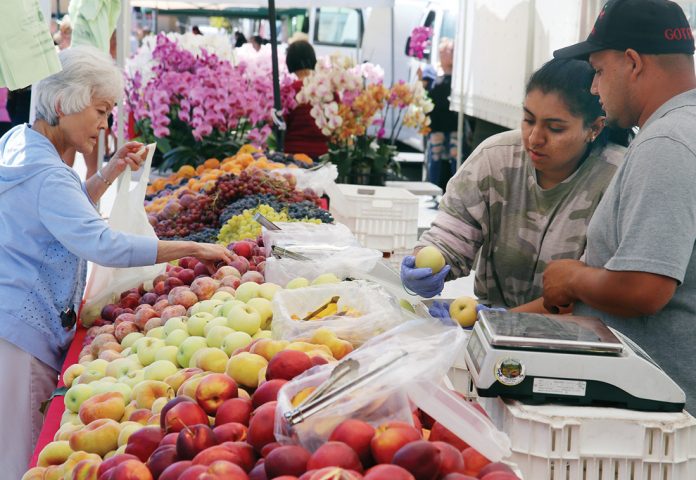
SANTA CRUZ COUNTY—Catherine Barr, Executive Director of Monterey Bay Certified Farmers Markets, was in good spirits Tuesday. She had just received news that the Cabrillo Farmers Market in Aptos would remain open during the countywide shelter-in-place order due to COVID-19.
“I am over the moon right now,” Barr said. “This is great news for us and for this community.”
Farmers markets across the state have been unsure of whether they should (or are even allowed) to remain open during the outbreak. Decisions are still being made on a case-by-case basis.
In the Bay Area, California Farmers Markets have remained open, with County Health Departments designating them as “essential food sources” for the community during the coronavirus crisis. A similar designation has allowed for the market at Cabrillo to remain open.
Barr said that they have been working closely with the college, which has suspended all in-person classes, to find ways to open the market safely. Preventative measures will be taken, including shutting down the weekly live music area, providing hand washing and sanitizing stations, and requiring farmers and employees to wear gloves at all times. Many vendors will also offer “grab-and-go” produce that is pre-wrapped.
“A big thanks has to go to Cabrillo,” Barr said, singling out the school’s Director of Community and Contract Education Scott Johnson. “They have been so helpful in getting us back up and running.”
Cabrillo vendors were notified immediately Tuesday that they will be able to set up on Saturday morning as usual.
“Thank goodness we will have time to prepare,” said Lori Perry of Corralitos’ Blue Heron Farms, which has been selling at the market for about 25 years. “But we are really glad.”
Farmers markets are an alternative way to get produce and other fresh food in a clean, open-air environment—as opposed to the busy, close-quarter indoor stores. Items available include everything from lettuce and strawberries to eggs and other dairy products.
“You don’t get any fresher than buying from the farmers market,” Barr said. “It’s often passed directly from the farmer to the consumer… There is not so much handling.”
However, there is still no state—or even county—guidelines for all markets, something Barr said has been frustrating.
“I’ve been talking to other people, other market organizations about the closures… and there is no rhyme or reason to it,” she said. “It seems to depend on the city.”
In Watsonville, the weekly farmers market will also open after being shut down last week. Market Manager Jesus Madrigal told the Pajaronian last week that he was worried for the small local farms who depend on the market to make a profit. Madrigal had been working to find ways for vendors to sell their produce elsewhere.
But as of Wednesday night, the Watsonville Certified Farmers is back on.
New procedures will be put in place, including vigorous hand-washing and sanitizing, gloves for all vendors, and elimination of dine-in seating, samples and non-essential activities. Any vendors who are sick or showing any symptoms will not be allowed to set up.
“The Farmers’ Market will reopen… to make sure that we can continue providing access to food and nutrition to our community,” market organizers said in a statement on Facebook. “We encourage people to purchase their produce and food and take it home to enjoy.”
Plenty of small farms continue to be affected by the pandemic, as markets are only one way for them to sell their products. This is especially true for farms that usually also supply to restaurants—which are also taking a big hit due to closures.
“This is a hardship for many,” Barr said. “So many small farms… they have nowhere to put their produce. We are concerned that the impact will be very harmful.”
For now, however, the opening of these local markets is a positive step, Perry said.
“We’ve been at the market for so long… almost since it began,” she said. “It’s great we can keep going.”










